Taking Woodstock
 for graphic nudity, some sexual content, drug use and language.
for graphic nudity, some sexual content, drug use and language.
Reviewed by: Spencer Schumacher
CONTRIBUTOR
| Moral Rating: | Extremely Offensive |
| Moviemaking Quality: |
|
| Primary Audience: | Adults |
| Genre: | Comedy, Music, Drama |
| Length: | 1 hr. 50 min. |
| Year of Release: | 2009 |
| USA Release: |
August 26, 2009 (limited) August 28, 2009 (wide—1,300 theaters) DVD: December 15, 2009 |
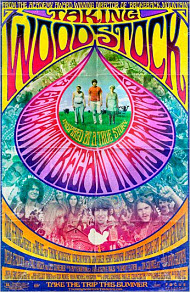

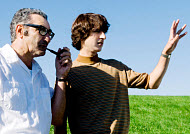
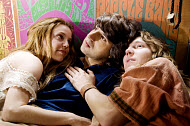
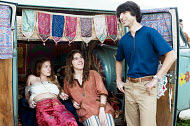
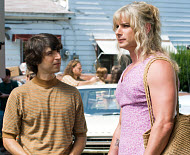
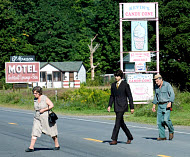
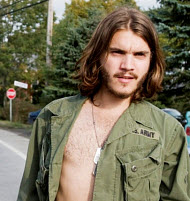

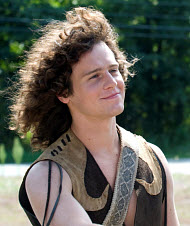
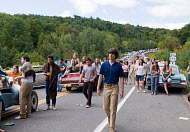
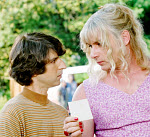
GAY—What’s wrong with being gay? Answer
Homosexual behavior versus the Bible: Are people born gay? Does homosexuality harm anyone? Is it anyone’s business? Are homosexual and heterosexual relationships equally valid?
What about gays needs to change? Answer
It may not be what you think.
Should I save sex for marriage? Answer
How can I deal with temptations? Answer
How far is too far? What are the guidelines for dating relationships? Answer
What are the consequences of sexual immorality? Answer
NUDITY—Why are humans supposed to wear clothes? Answer
Dancing in the Bible
How do I know what is right from wrong? Answer
How can I decide whether a particular activity—such as smoking, gambling, etc.—is wrong? Answer
CHANGE THE WORLD—A single man or woman can help change the world. Read about some who did with faith and God’s help…
Jesus Christ, Noah, Abraham, Joseph, Moses, and David
| Featuring |
Emile Hirsch, Liev Schreiber Jeffrey Dean Morgan Dan Fogler, Eugene Levy Katherine Waterston Paul Dano See all » |
| Director |
Ang Lee |
| Producer | Focus Features, Celia D. Costas, Patrick Cupo, Ang Lee, David Sauers, James Schamus |
| Distributor |
 Focus Features, a subsidiary of Universal Pictures, a division of NBCUniversal/Comcast |
“A generation began in his backyard.”
When you put Taiwanese director Ang Lee (“Crouching Tiger, Hidden Dragon”) at the helm of a movie about the quintessential event that defined America’s counterculture movement of the Sixties, one pretty much knows what to expect going in. Ang Lee’s films often focus on non-traditional forms of love and family. He explored homosexual relationships in “Brokeback Mountain” and broken families in “The Ice Storm.” In his latest film, “Taking Woodstock” he explores the idea of communal families.
Anyone with any knowledge of the Sixties has undoubtedly heard of ‘Woodstock’ and has at least a general idea of what the four—day arts and music festival was about. In the backdrop of America’s involvement in Vietnam it was a concert to raise the issues of peace, free love and of course provide some really good music, the most prominent names in Rock & Roll performed at Woodstock, the notable exception being Bob Dylan. And of course wherever you have Rock & Roll you must also have sex and drugs. This is the spirit in which we find Ang Lee’s exploration in ‘Taking Woodstock’.
It should be noted that Focus features provided a multi-page reference guide to the film. It includes (for those who have not been indoctrinated into ‘hippy’ culture) a ‘dictionary’ of common counter-culture slang. It also provided a timeline of important historical events leading up to Woodstock, including events in Vietnam and the moon landing. These references help to provide an understanding to the significance of this event.
Like any movie that serves as a dramatic reenactment of a historical period it’s historical accuracy will be the subject of debate. How much of “Taking Woodstock” is historically accurate is left up to the interpretation (as well as prior knowledge) of the viewer. Though the film does have an actual, historical event as its backdrop, it is more interested in telling the story of one man’s journey through this pivotal four-day event, and that’s the story of Elliot Teichberg played by Demetri Martin.
Elliot along with his father Jake and mother Sonia are in jeopardy of losing their upstate New York bed and breakfast inn. He discovers that the organizers of a music and arts festival have had their permit turned down by the local townspeople of another New York community. Seizing the opportunity to raise the funds to save the inn, he invites the Woodstock organizers to explore White Lake and hold their festival there.
The film is essentially Elliot’s ‘coming of age’ story as he is trapped between the decision of saving the inn and by extension his family or escaping to California and exploring his talents as an artist. This four-day festival serves as the catalyst for Elliot to discover who he truly is. This exploration is the heart of the story and the material that many viewers, particularly the Christian viewers of this site, will find most objectionable.
Objectionable Material
As was previously mentioned, anyone with any prior knowledge of this part of US history, and of this specific event should not be surprised at the numerous scenes involving sex and drugs. There are many scenes of full frontal (both male and female) nudity and scenes where characters either entirely disrobe or start out with no clothing to begin with. Though there are no explicit sex scenes depicted in the film, there are scenes where sex is implied as couples (man and woman, man and man) are seen cavorting in the bushes. As in Ang Lee’s previous Oscar nominated film, the theme of homosexuality is explored and there is a scene of two men French-kissing. A major character in the film is a transvestite played by Liev Schreiber (“Defiance”) whom at one point pulls up his dress to show Elliot his ‘package’ and what is shown, merely covered by tight-fitting pantyhose leaves very little to the imagination.
As was common to the period as well, the film contains a fair share of profanity. There are approximately 30 uses of various forms of the ‘F’ word as well as a handful of other mild to profane issuances of words that may be considered offensive. The other ‘f’ word (a derogatory word used towards homosexuals) and the term “Jew” are used in a derogatory manner along with a swastika painted as graffiti.
And, of course, this being the sixties, there are many scenes of characters doing many forms of drugs including alcohol, marijuana and an extensive scene of a character experiencing an acid trip.
Since this film focuses on ‘love’ there is little violence in the film except a scene of characters getting beat up (mostly chased away) with baseball bats and a handgun. On that note, Jesus is never mentioned as the true source of love, and is only cited as a historical footnote in a play performed during part of the festival. This reference is not done in a degrading manner and certainly not in vain, just as an aside. However, the lack of Jesus’ presence in a film (and festival) that has the theme of ‘peace’ and ‘love’ will undoubtedly offend those who find their source of peace in the prince of peace and their source of love in the gospels.
Lastly, the film touches upon some events from the period (particularly Vietnam and the anti-war protests) that have been and will continue to be controversial. I’m not going to debate them here, that’s another topic for a more appropriate forum. However, if you are a person that has a strong opinion either way about the war then your take on this movie may be affected by the references the film does make to that historic event.
As far as the film itself, the performances are fine, there just does not seem to be much for the characters to dig into. As in the case of ‘Brokeback Mountain’ (my opinion anyway) the love story is not original, just the players involved in its fulfillment. Ang Lee is a filmmaker known for the cinematography of his films. As opposed to the pristine Wyoming mountains of “Brokeback Mountain” or the lush forests in “Crouching Tiger, Hidden Dragon” there is not very much to marvel here in the bland, often muddy hills of White Lake, New York.
If one is interested in seeing the film solely for its depiction of this significant point on the timeline of American history, then there are other films that do it as well if not better and there are countless documentaries and historical archives depicting this four-day festival and its historical significance.
There’s little doubt that Ang Lee will have much critical acclaim given to him for this film and “Taking Woodstock” will probably garner the same Oscar attention of many of his previous films. If you are a film-goer that’s inclined to see movies that garner critical acclaim and receive Oscar nominations and perceive these accolades to be an indication of a film’s merit, then be advised as to what you are getting into when you purchase a ticket and take yourself to this fairly accurate depiction of Woodstock. There is plenty in this film that Christian audiences will find objectionable.
Violence: Minor / Profanity: Heavy / Sex/Nudity: Heavy
See list of Relevant Issues—questions-and-answers.


PLEASE share your observations and insights to be posted here.
